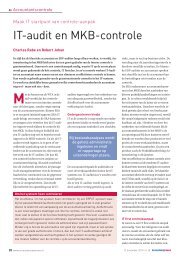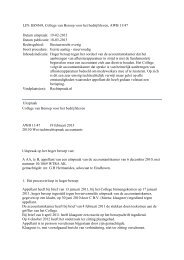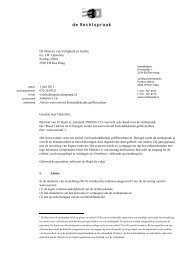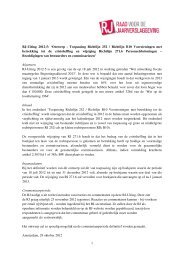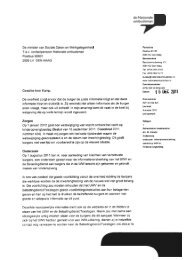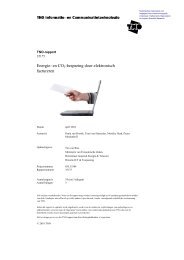Appetite for change - Accountancy Nieuws
Appetite for change - Accountancy Nieuws
Appetite for change - Accountancy Nieuws
You also want an ePaper? Increase the reach of your titles
YUMPU automatically turns print PDFs into web optimized ePapers that Google loves.
As demonstrated previously, the business community isready <strong>for</strong>, and supportive of, government action. Whenenvironmental policies are unstable and unclear, businesseslook to governments <strong>for</strong> leadership. Speaking at the climate<strong>change</strong> meeting in Copenhagen, JohnsonDiversey’s ChairmanCurt Johnson said, “Once industry adopts a mindset thatequates greenhouse gas emissions with waste, we’ll makeprogress in ways and to an extent that we have never seenbe<strong>for</strong>e. This will be good <strong>for</strong> the planet and good <strong>for</strong> ourbusinesses. But we must act and we must act now.” 1 A largemajority of business executives believe that governmentsshould help lead the behavioural <strong>change</strong>s that will both guideand encourage such action.Figure 4Just under half think government should take the lead on <strong>change</strong>Total (%)27 10 18 44UK 14 8 10 68France 26 4 24 44Germany50 28 2 20Spain 14 18 11 57Sweden27 13 60Netherlands 18 11 29 43Seventy one per cent of businesses believe governments,either alone or in cooperation with the private sector andindividuals, should provide leadership (see fig. 4). Executivesin the UK and China are most likely to say governmentsalone should have primary responsibility <strong>for</strong> leading <strong>change</strong>.However, even in the US and South Africa, where more thanone third of companies believe the market alone should lead,the majority of business leaders still feel the government mustplay the leading role.Czech RepublicCanadaUSARussiaBrazilChinaIndia21 11 14 5424 10 6 6021 14 38 2330 7 6344 20 16 2016 16 6834 12 22 30Many organisations across the world already expect to<strong>change</strong> the way they conduct business in the next two tothree years, as a result of climate <strong>change</strong> (see fig. 7 on page17). Business leaders in Brazil, India, China and Russiaare more likely to be sceptical that <strong>change</strong>s are imminent.Russian business executives are most likely to expect noimpact from climate <strong>change</strong> in the next few years.South AfricaAustraliaA combination30 37 3328 15 58IndividualsBusiness (the market)Who do you think should have primary responsibility <strong>for</strong> leading behavioural<strong>change</strong> in relation to climate <strong>change</strong>? Base: Total (654)Government1Press Release, WWF, Dec 13, 2009 downloaded from www.worldwildlife.org 15 December 2009<strong>Appetite</strong> <strong>for</strong> <strong>change</strong>. PricewaterhouseCoopers. 13



